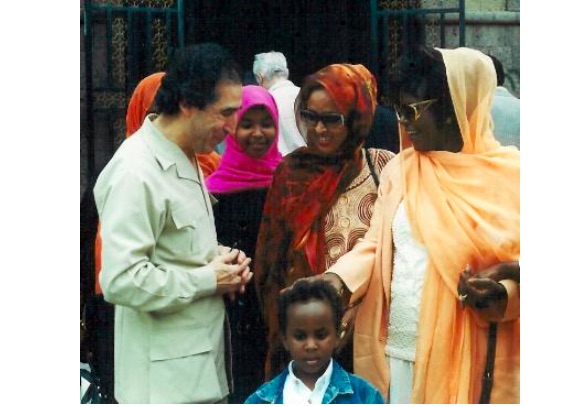TOLERANCE AND SOLIDARITY .
An obituary from Initiatives of Change International
September 24, 2018. It is with immense sadness that we announce that Ambassador Mohamed Sahnoun, former President of Initiatives of Change International, died on 20 September 2018.
Mohamed Sahnoun was chosen by two UN Secretary-Generals as their Special Representative in some of Africa’s most intractable conflicts. They knew him as a man with a remarkable ability to persuade warring factions to meet and talk.

Photo from Early History of the Culture of Peace
FThis was partly a product of his wide experience as a diplomat. He had been Deputy Secretary-General of the Organisation of African Unity and of the Arab League. He had served as Algeria’s Ambassador to Germany, France, the USA and Morocco.
But even more, it was a product of his approach to life. As a young man, during Algeria’s struggle for independence from France, he had been arrested by the French authorities and severely tortured. Yet as a diplomat he established warm relations with French leaders. As he said later, ‘My passion is to save endangered populations from the extreme insecurity of war, famine, drought and disaster,’ and he sought to enlist all who could help in that task.
His approach did much to resolve the tensions arising from the process of decolonisation across the African continent. His help was sought in situations large and small. His most satisfying task, he said, was mediating the transition of South-West Africa into the new country of Namibia. But he also dealt with innumerable places where towns and villages, divided by colonial straight-line borders, had to be adjusted. Sahnoun was often the person who mediated a solution.
UN Secretary-General Boutros Ghali chose him as his Special Representative to Somalia in 1993, when the country had erupted into severe conflict. Sahnoun reached out to all sides, and a basis for resolving the conflict was emerging. Then Boutros Ghali told him that the USA intended to intervene militarily. Sahnoun protested vehemently and, when told that the decision had been made, resigned. The US intervention was a disaster.
(Articles continued in right column)
Where in the world can we find good leadership today?
(continued from left column)
Sahnoun was always searching for more effective ways to bring peace. He supported the UNDP initiatives for ‘human security’, which focused on meeting the basic needs of citizens and thereby overcoming insecurity. He advised UNESCO on its Culture of Peace programme and advised Kofi Annan on environmental and development issues. He was a member of the Brundtland Commission.
He served as co-chair of the International Commission on Intervention and State Sovereignty, which developed the concept of Responsibility to Protect. ‘Mohamed had an extraordinary capacity to bring people together and bind wounds,’ wrote his co-chair, former Australian Foreign Minister Gareth Evans. ‘He played an indispensable role in searching out the common ground between North and South which made possible the birth of Responsibility to Protect. We will particularly remember his delightful capacity to defuse tensions, usually with African parables involving lions, monkeys, crocodiles, scorpions or all of the above.’
In 2008, together with Cornelio Sommaruga, former President of the International Committee of the Red Cross, he launched the Caux Forum for Human Security. As he said in an interview with the Huffington Post, ‘The idea came from my sense of the deep insecurity in today’s world. Insecurity is born of fear. We must look to the root causes of that fear, and address it with far more energy and cohesion.’
He chose the IofC centre in Switzerland, Caux, as the venue because ‘it is a place where interreligious dialogue is deeply established. I had heard about Caux and Moral Re-Armament (the previous name of Initiatives of Change) from friends over many years. Caux was a safe place where people could build trust in one another.’
In Sahnoun’s view, achieving human security depended on progress in five areas, which he defined as just governance, inclusive economics, intercultural dialogue, environmental sustainability and healing historical wounds. ‘So often the understanding of security has focused purely on physical security,’ he said. ‘But human security is about the very fundamentals of our existence. I place special emphasis on healing wounded memories. In Algeria, Northern Ireland, the Balkans and other places of long pain and violence, the feelings run so deep that a special effort is called for.’
The Caux Forum brought together several hundred people each year, who explored these five concerns jointly. Many initiatives have emerged. In Eastern Europe there is a new emphasis on uncovering and healing the wounds resulting from war and authoritarian rule. And Caux is now doing much to bring the importance of land restoration to international attention.
Sahnoun served as President of Initiatives of Change International for two years [2007-2008], and his insights have helped shape Initiatives of Change programmes throughout the world.
Watch Mohamed Sahnoun’s opening speech of the 3rd Caux Forum for Human Security in 2010 and an interview with him in 2011.